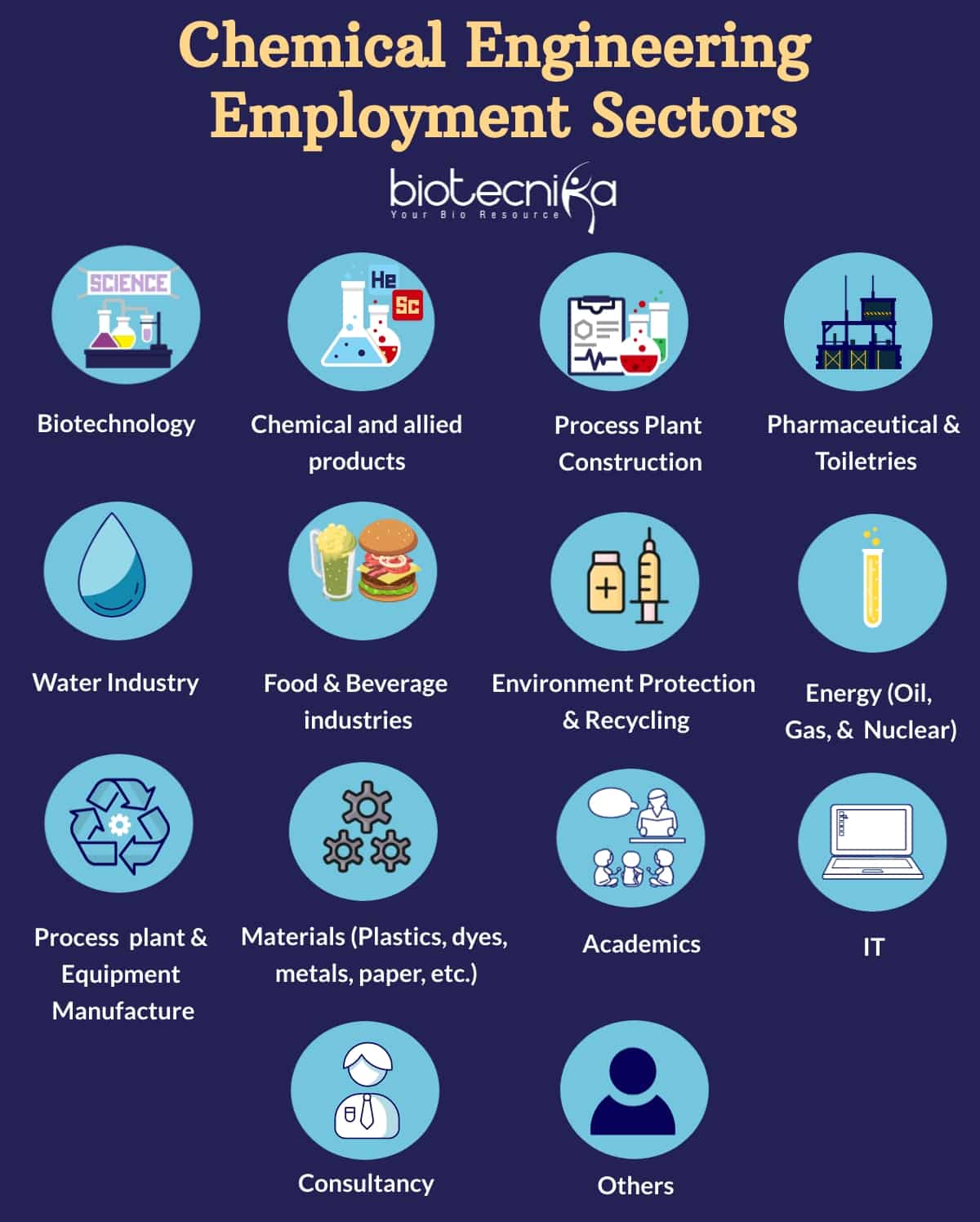Career path and scope of Chemical Engineering
What is chemical engineering?
Chemical engineering is a multidisciplinary discipline of engineering that links natural and experimental sciences (like chemistry and physics), along with life sciences (like biochemistry, biology, and microbiology) along with maths and economics to devise, develop, produce, modify, transport, operate and manage the manufacturing processes that convert raw materials into useful products.
Chemical engineering involves the production and manufacture of products through chemical processes. This entails designing equipment, systems, and methods for refining raw materials, compounding, and processing chemicals.
Chemical engineers, sometimes referred to as “universal engineers” as it is a broad discipline, turn raw materials into beneficial products like food, clothes, and energy. Processes and products are the focus of their work – they design and develop the processes that produce products. They either focus on improving existing processes or developing new ones. They are also involved with resource management, environmental protection, and health and safety.
They translate processes developed in the labs into real-world applications for the commercial production of products. They rely majorly on biology, chemistry, mathematics, and physics.
Chemical engineering is generally applied in large-scale production plants to increase productivity and product quality at the same
time reducing expenditures. Chemical engineering is applied in industries like aerospace, automotive, biomedical, electronic, environmental, medical, and military to develop and enhance their technical products like ultrastrong fibers, fabrics, adhesives for vehicles, biocompatible materials for implants and prosthetics, films for optoelectronic devices, etc.Educational qualifications
- Bachelors’– Chemistry, Physics, and Mathematics must be taken as core subjects in the 12th grade for getting admission to a bachelor’s degree program in chemical engineering. Students may also have to qualify for certain entrance exams administered by the state, central, and private universities before being admitted.
- Masters – A Bachelor’s degree in chemical engineering or other relevant fields with good scores from a recognized institute is required for admission to the master’s program. Some institutes/colleges may also conduct entrance exams as part of the admission procedure.
- Ph.D. – The student must hold an M.Sc. or M.Tech degree in Chemical Engineering or other related fields from a recognized university to get admission to the doctoral program. Those who wish to continue their research can opt for post-doctoral programs.
Major Subjects Covered in Chemical Engineering
- Air Pollution Control Engineering
- Biochemical engineering
- Chemical Engineering Economics and Plant Design
- Chemical Process Industries
- Chemical Reaction Engineering
- Environmental engineering
- Environmental Pollution Control and Safety Management
- Fertilizer Technology
- Fundamentals of Heat and Mass Transfer
- High polymer engineering and fluid mechanics
- Instrumentation and Process Control
- Introduction to Electrical and Electronics Circuits
- Introduction to Numerical Analysis
- Material science and engineering
- Petrol refinery engineering
- Process instrumentation
- Safety engineering
- Thermodynamics
Specializations in Chemical Engineering
- Biomedical Engineering
- Bioenergy
- Catalysis
- Colloids
- Plant design
- Polymers and biopolymers
- Nanotechnology
- Product design
- Environmental engineering
- Reactor technology
- Fiber technology.
- Process Engineering
- Food Processing
- Electrochemical
- Polymers
Top 10 Institutes for Chemical Engineering
- Anna University, Chennai
- Birla Institute of Technology
- Bharat Institute of Technology
- CV Raman college of engineering
- Delhi Technological University
- Galgotias university
- Indian Institute of Technology Bombay, Bombay
- Indian Institute of Technology Delhi, Delhi
- Indian Institute of Technology Guwahati, Guwahati
- Indian Institute of Technology Hyderabad, Hyderabad
- Indian Institute of Technology Kanpur, Kanpur
- Indian Institute of Technology Kharagpur, Kharagpur
- Indian Institute of Technology Madras, Madras
- Indian Institute of Technology Roorkee, Roorkee
- Jadavpur University, Kolkata
- Lovely Professional University
- Manipal Institute of Technology
- Meerut Institute of engineering
- MS Ramaiah Institute of Technology
- National Institute of Technology, Surathkal
- NIT, Calicut
- NIT, Durgapur
- NIT, Trichy
- NIT, Warangal
- PKG college of engineering and technology
- Sarvottam Institute of technology
- Shiv Nadar University
- VIT, Vellore
Skills
General skills:
- Ability to think creatively
- Ability to learn independently
- Analytical skills
- Communication skills
- Decision-making skills
- Good attention to detail
- Interpersonal skills
- IT skills
- Mathematical skills
- Organizational skills
- Problem-solving skills
- Project management skills
- Teamwork and leadership skills
- Time management skills
Technical skills
- Advanced lab skills
- Commercial awareness of chemical engineering fields.
- Interest in Chemistry
- Knowledge of chemical engineering principles, processes, and practices.
- Knowledge of the commercial applications of science, chemical engineering, and general engineering.
- Knowledge of ethical issues within chemical engineering
- Knowledge of production processes
- Knowledge of terminology utilized in the chemical, minerals, and material industries.
- Skill to interpret and draw conclusions from complex data sets
- Understanding of core scientific topics across all sciences.
Role of a Chemical Engineer
Most chemical engineers work in manufacturing, designing machines, and plants. Their main task is to make sure that the processes run smoothly and cost-effectively. These types of job roles are often referred to as “process engineers.” They are responsible for creating and manufacturing a broad array of products, like dyes, fertilizers, food products, medicines, paper, petrochemicals, plastics, polymers, etc.
Chemical engineers are responsible for a wide range of roles and responsibilities, including:
- Carry out analyses and monitor the performance of methods throughout the production.
- Carry out research to develop new and improved manufacturing methods.
- Construction, installation, and supervision of manufacturing plants and equipment.
- Designing and inventing new chemical processes/products.
- Designing and planning the layout of equipment.
- Developing highly improved manufacturing processes.
- Develop methods for separating components of liquids and gases or for producing electrical currents by utilizing controlled chemical processes.
- Establishing safe working conditions within chemical industries.
- Establishing safety procedures for people handling hazardous chemicals.
- Estimating production costs for management.
- Evaluation of equipment and methods for acquiescence with safety and environmental regulations.
- Formulating environment-friendly health and safety measures.
- Identify and resolve production-related issues.
- Manufacturing chemical materials that are improved and of high quality for industrial production.
- Planning and operation of industrial plant equipment.
- Processing of food and agricultural commodities, cosmetics, etc.
- Research and development of activities in biotech companies.
Employment Sectors
- Chemical Plants
- Government agencies
- Paper/Textile Manufacturing Industries
- Pharmaceuticals
- Research
- Speciality chemicals
Working environment
Chemical engineers are employed in various industries; therefore, they work in a wide range of settings.
Chemical engineers are needed by both small and large companies, as well as government agencies. However, most chemical engineers do work in bigger companies as part of a team. On average, three-fourth of chemical engineers work in manufacturing industries.
Goggles and helmets are a must for chemical engineers who work with large industrial manufacturing sites. The manufacturing units can occasionally be outdoors, and the engineer may require to be in adverse weather conditions.
While other chemical engineers mostly spend their entire working hours in the laboratory. Some engineers work in various fields, like designing projects on a computer, testing them in a laboratory, and then moving on to the production stage.
Job profiles
- Absorption and adsorption engineers
- Analytical chemist
- Architectural and Engineering Managers
- Biomedical Engineers
- Biotechnologist
- Chemical engineer
- Chemical Material Scientists
- Chemical Plant and System Operator
- Chemical process engineers
- Chemical research engineers
- Chemical Technicians
- Colour technologist
- Energy engineer
- Energy manager
- Environmental and Healthcare Engineer
- Environmental engineer
- Food Scientist
- Fuels engineers
- Manufacturing Production Technician
- Nuclear engineer
- Petroleum engineer
- Plastics engineers
- Polymerization engineers
- Process engineers
- Product/process development scientist
- Manufacturing engineer
- Materials engineer
- Mining engineer
- Nuclear Engineers
- Oxidation engineers
- Production manager
- Quality manager
- Refinery process engineers
- Waste management officer
- Water engineer
Top employers
- Arofine Polymers
- Baker Hughes
- Bharat Petroleum Corporation Limited (BPCL)
- Deepak Fertilisers and Petrochemicals
- Colour-Chem Ltd
- Essar Group
- GAIL Limited
- Government Organizations
- Gujarat Gas Company Limited
- Hindalco Industries
- Hindustan Copper Limited
- Hindustan Petroleum Corporation Limited (HPCL)
- HLL Lifecare Limited
- Indian Oil Corporation Limited
- Infosys
- L & T
- Merchem Limited
- Narcotics Control Bureau
- Nirma
- ONGC
- Pfizer Inc.
- Piramal Healthcare Limited
- Sun Pharmaceutical
- Reliance Industries
- Wipro
Salary
Government and private sector jobs are available in abundance for chemical engineers in India. Chemical engineering graduates can find employment in the private sector in industries like Biotechnology Sector, Cement Factories, Fertilizer Factories, Food Processing Units, Petrochemicals, Petroleum Refineries, Pharmaceutical Industries, etc.
The salary for chemical engineers is quite high. A month’s salary for a new hire can range from INR 25,000 to INR 30,000, depending on the position. Earnings of INR 5-7 Lakhs per year are possible with experience and certain skill sets. While salaries in the private and public sectors differ, those who are willing to work abroad can expect to earn a high salary.
The Scope of Chemical Engineering
Original chemical engineering involved industrial-scale chemical production, but it has since been applied to a wide range of fields of knowledge and industries. Chemical Engineering is a vast field of study, with applications in textiles, plastics, food, petroleum, pharmaceuticals, and many other areas of study. Chemical engineers are in high demand in many of these manufacturing and service sectors, which opens up a wide range of employment opportunities for graduates. Chemical engineering is quickly becoming one of the most attractive career options for graduates in India and abroad.
When it comes to career prospects, chemical engineering is considered one of the most promising options, with a wide range of employment opportunities available. Students of chemical engineering will have more opportunities in the future as the Indian industrial sector is expanding. Recent trends indicate that the industry will continue to grow and evolve in the coming years in areas of production, designing, research, and development. Due to this, the demand for chemical engineers will skyrocket in emerging industrial sectors over the next few years.
A final point worth noting: students who want to enter the industry should focus on acquiring thorough knowledge and skillsets and should pursue their engineering education at a school that can serve as a solid foundation for their careers. Today, most core companies hire freshers through campus recruitment from prestigious institutions. So, if you want to work in chemical engineering core companies, you should enrol in a reputable educational institution that can provide you with industry-tested knowledge, polish your skills, and assist you with on-campus placements.
For certification courses, please visit Rasayanika Store
Also read:
- Pharmaceutical Analysis: Career Path, Companies Hiring, And Job Scope
- How to Become a Flavour Chemist in India?
- Pharmaceutical Analysis: Career Path, Companies Hiring, And Job Scope
- Synthetic Chemistry Career Path & Job Prospects
Keywords: Career path and scope of Chemical Engineering; Career and scope of Chemical Engineering; Career path and scope of Chemical Engineering; Career and scope in Chemical Engineering


















































Dear
Evening is fine, except best chemical Engineering colleges and there placement, please let me know at what basics you have mentioned some private colleges batter than IITs NITs and some CFTI institute.if you don’t have proper information than why are you writing something. As a chemical Engineer and as a faculty of chemical Engineering department, NIT Jalandhar, it’s really hurting me.
Chemical engineering
Nice post on chemical engineering
Remarkable!!!
Proud to be a Chemical Engineer.
Fantabulous information, quite concisely mentioned.
Great Job!!!
This post was incredibly informative! I never realized the wide range of opportunities available in chemical engineering. The insights into career paths and industry applications really opened my eyes to the scope of the field. Thank you for sharing such detailed information!